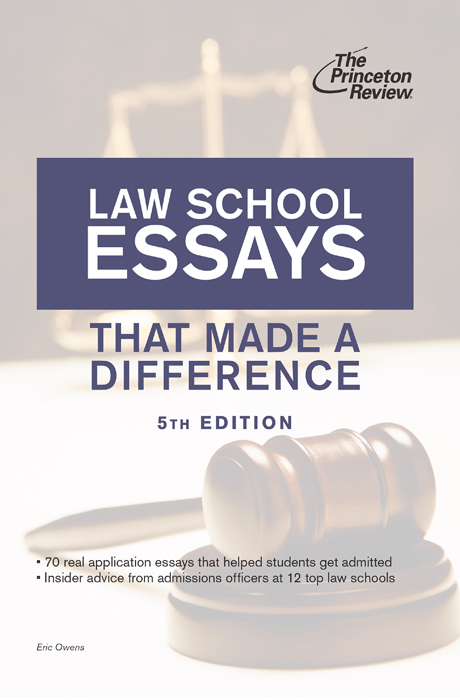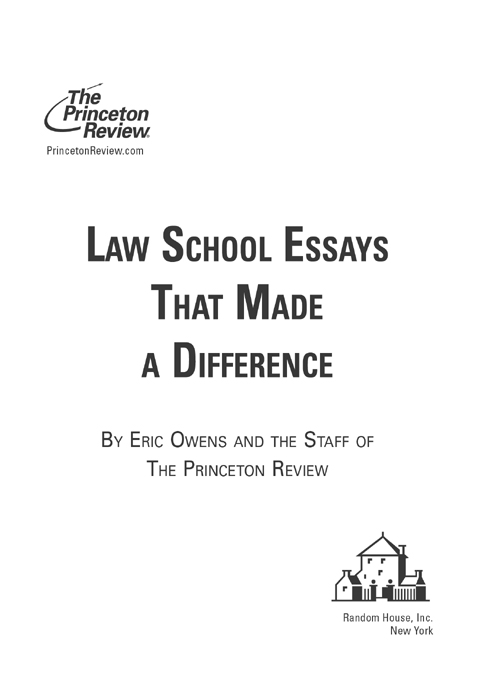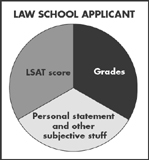The Princeton Review, Inc
111 Speen St., Suite 550
Framingham, MA 01701
E-mail:
2012 by The Princeton Review, Inc.
Cover art Design Pics Inc. / Alamy
All rights reserved under International and Pan-American Copyright Conventions. Published in the United States by Random House, Inc., New York, and simultaneously in Canada by Random House of Canada Limited, Toronto.
The Princeton Review is not affiliated with Princeton University.
eBook ISBN: 978-0-307-94526-6
Paperback ISBN: 978-0-307-94525-9
Senior VPPublisher: Robert Franek
Editor: Kristen OToole
Production: Best Content Solutions, LLC
Production Editor: Jessica Sauer
v3.1
ACKNOWLEDGMENTS
Special thanks to Ian Van Tuyl, Rob Tallia, and David Adam Hollander, Esq., who provided me with a solid foundation from which my understanding of the law school application process grew.
I also wish to thank John Katzman and Rob Franek for their support of my work and ideas.
I am grateful to my editor, Laura Braswell, for her counsel during my work on the manuscript.
CONTENTS
Introduction
HOW TO USE THIS BOOK
The first part of this bookyou are reading it nowaddresses how to write a great personal statement for your application to law school. Theres no magic recipe, of course; nevertheless, if you follow our advice about what to put in and what to leave out, were confident that youll end up with a memorable personal statement that will differentiate you from the larger applicant pool and make you a more competitive candidate.
The second part consists of interviews with the deans and directors of admissions at eight of the most selective law schools in the nation. Read what they have to say about the role that personal statements play in the admissions process. Their statements lend a human perspective to the sometimes harrowing law school admissions process.
The third part contains several unedited, unexpurgated personal statements written and submitted by actual law school applicants to a variety of selective law schools. Youll find that not every sentence is eloquent, nor every comma perfectly placed. These are the essays as they were submitted, read, and ultimately accepted. We think theyre all solid. Some are excellent. More importantly, theyve all passed the ultimate test for law school application soundnesstheir authors gained acceptance into at least one of the top law schools to which they applied.
Its important to note that the statements youll find in these pages were written by students of diverse backgrounds and objectives. As with most collections of prose by a group of authors, this compilation may contain interesting or unexpected juxtapositions of ideas. The applicants whose work is featured in this book wrote about a variety of topics, including their relationships with family members, experiences in the working world, and difficulties with physical disabilities. There are some essays with somber themes and others that are more upbeat. Youll find accounts of achievement and stories of failure. These essays reveal a range of creativity and cleverness with the written word. Some are so good that they will intimidate you; others may hardly impress you. Some are strange; others will perhaps strike you as commonplace. No single type of essay is better than any other. We think youll find, as we have, that the most memorable essays illuminate their writers. They are believable and perhaps relatable, but above all else, theyre sincere.
Ideally, these personal statements will inspire you; supply you with paradigms for narrative and organizational structures; and teach you themes, illustrious words and phrases, and ways to express yourself that you hadnt considered, which will help you write exactly what you wish to communicate.
Of course, the personal statement doesnt stand alone. It has a place within the larger admissions context, and in this book, we show you the whole pictureincluding LSAT scores, undergraduate GPAs, work history, extracurricular involvement, and a complete list of admissions decisions for every single applicant whose essay youll read. In this way, we hope to provide you with a thorough understanding of the relative selectivity of each of the top law schools featured and of the admissions context in which the personal statement comes into play.
Finally, though it goes without saying: Dont plagiarize the personal statements in this book. Thats worth repeating: Do not plagiarize the statements you read in this book. Different law schools ask different questions. Some simply ask for a personal statement. Others want you to answer several short essay questions in addition to writing a personal statement. Requested lengths will vary. We encourage you to note buzzwords, structures, and themes that you like. But draw the line at copying paragraphs, sentences, or even phrases. Theres a chance youll get caught and wont get into law school at all. Penalties notwithstanding, plagiarism is simply wrong, so dont do it. Period.
LAW SCHOOL ADMISSIONS: A BRIEF OVERVIEW
Law school admissions counselors say that they do not use a formula to determine which applicants to accept or reject. Insofar as nobody plugs all the parts of your application into a mathematical equation that generates decisions, its true that there is no formula.
In the grand scheme of things, however, getting into law school comes down to a very basic set of requirements. Wherever you apply, your application will be divided into three roughly equal parts: your undergraduate grades (and your graduate school grades, if applicable); your LSAT score; and the subjective stuff, which consists of your personal statement, your professional experience, and all the other intangibles that cant be measured numerically. It is this third part that keeps the law school admissions process from becoming an entirely predictable quantitative assessment.
T HE A DMISSIONS I NDEX
When evaluating your application, law schools will usually combine your grades and your LSAT score into an index. The index is a number (which varies from school to school) that is made up of a weighted combination of your UGPA (undergraduate grade point average) multiplied by your LSAT score. Your LSAT score is often weighted more heavily than your UGPA. (After all, the LSAT serves as a standard by which admissions officers can reliablyif, some may argue, arbitrarilycompare the performance of one candidate with that of the applicant pool at large.) While the process differs from one school to another, it is generally the case that your index will put you into one of the three categories described below.
(Probably) Accepted. A select few applicants who have high LSAT scores and stellar GPAs are admitted virtually automatically. If your index is very, very strong as compared with the median or target index of the school to which you are applying, then youre as good as in.
(Probably) Rejected. If your index is very weak compared with the median or target index of the school to which you are applying, then you are probably going to be rejected without much to-do. When admissions officers consider an application with a weaker index, theyll be on the lookout for something outstanding or unique (like, say,


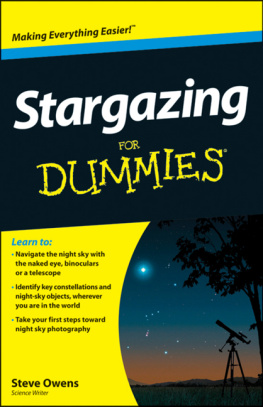
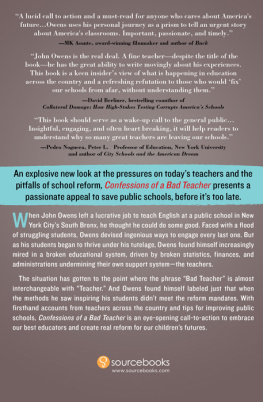
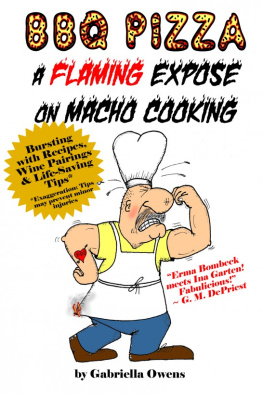
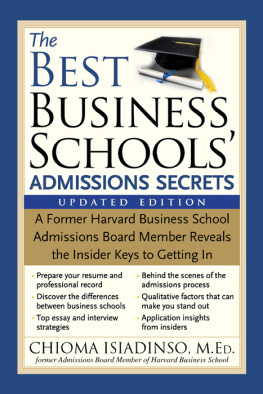
![Reding - Grads Guide to Graduate Admissions Essays] : Examples from Real Students Who Got into Top Schools](/uploads/posts/book/101661/thumbs/reding-grad-s-guide-to-graduate-admissions.jpg)
